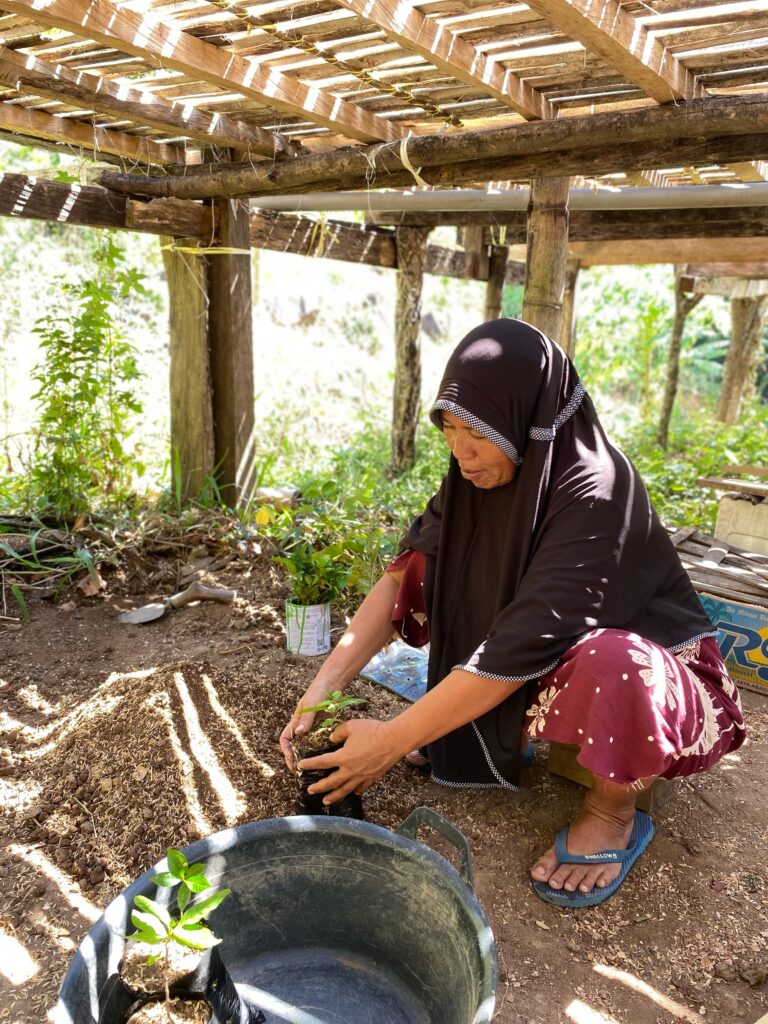Daeng Ngasih, a 50-year-old Indigenous Woman from Bonto Manurung Village, Maros Regency, has gone through a challenging life journey. Since childhood, adulthood, until marriage and having children, she often underwent heavy physical activities. However, in the last few years, since Daeng Ngasih's health condition began to decline, her ability to carry out routines is no longer the same as before. Nevertheless, her enthusiasm to actively contribute to her family and community amidst the challenges faced by the climate crisis remains strong.
Daeng Ngasih regularly attends activities horticulture training or planting vegetables in the yard facilitated by SCF through the Estungkara program in supporting food sovereignty which is one of the characteristics of indigenous communities. This training was a turning point for Daeng Ngasih. He became one of the participants in the training. This is where he learned about efficient farming techniques, as well as the importance of plant diversity.
Horticulture training not only provided knowledge, but also changed his perspective on the potential around his house. After the training and mentoring, Daeng Ngasih began planting several seeds from the distribution after the training such as eggplant, chili, tomato, mustard greens, and various other vegetables in his small yard.
"Little by little, the land that was previously only used for long-term crops is now developing into a vegetable garden," said Daeng Ngasih happily.
Daeng Ngasih took care of his plants by practicing the training techniques he had acquired. After some time, he began to enjoy the eggplant harvest he had planted. It was not just about enjoying fresh vegetables, but also about the sense of accomplishment that made him feel more empowered.
She is happy because she is able to utilize simple, environmentally friendly planting media. By only using a mixture of soil, husks, and animal manure, as well as liquid organic fertilizer from the remaining rice washing water, Daeng Ngasih shows that sustainable farming does not require large costs. She also tries to change the understanding of other women who still believe that planting vegetables can only be done during the rainy season.
"Through this training, I understand that many vegetables can grow with less water, making it easier for us women to start farming without having to wait for the season," said Daeng Ngasih.
By sharing seeds and knowledge on how to plant, Daeng Ngasih empowers not only herself, but also her community. She encourages and fosters a collective spirit among other women to utilize their yards.
In this process, Daeng Ngasih became a real example that indigenous women can play an important role in increasing food security and empowering family economy.
The changes experienced by Daeng Ngasih reflect the power of women in forming a more independent community. By cultivating her yard, Daeng Ngasih not only improves her family's health with fresh vegetables, but also reduces dependence on the market to maintain food sovereignty his community.
Now, Daeng Ngasih no longer buys vegetables, only fulfilling other needs such as fish, onions, and so on besides vegetables. In terms of economy, this has a significant impact on his family's economy.
In the face of challenges, she not only finds a way to adapt, but also brings change to those around her. Through this good practice, Daeng Ngasih shows that women, when given knowledge and support, are able to change things not only for themselves, but also for the wider community. In the midst of her humble life, she has planted seeds of hope and inspiration for many in her village.
Written by Dewi Utari, SCF Makassar


